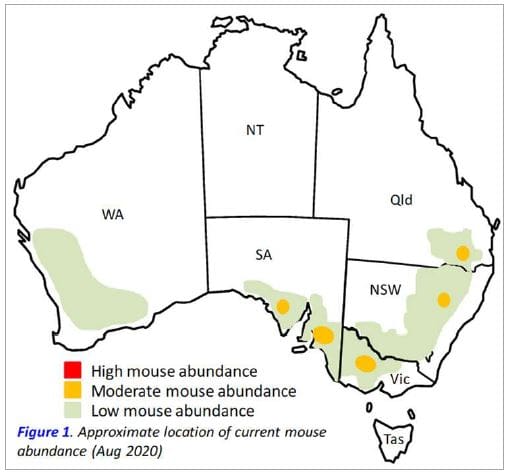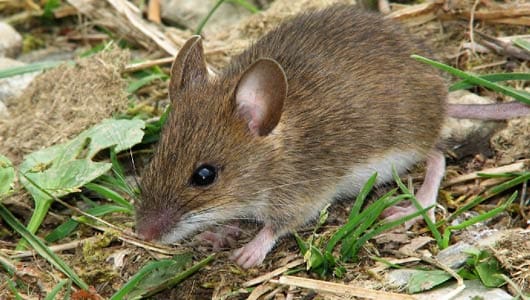
MODERATE mouse activity has been reported in parts of South Australia, Victoria, New South Wales and Queensland, but mouse numbers remain low in many other areas, according to the latest results from monitoring conducted in June/July/August by CSIRO Health and Biosecurity.
Moderate or high numbers of mice at this time of year are of concern because breeding will commence soon, so populations will start at relatively high densities.
Breeding will not commence until the start of spring, but some regions have had good rains and mild winters, and breeding could start early.
Authorities urge growers to actively monitor mouse activity, particularly using mouse chew cards which are useful at this time of year.
State-by-state
Western Australia
Mouse activity is low around the Geraldton and Ravensthorpe areas, but some baiting activity near Esperance. In Ravensthorpe, there was some mouse activity: low activity on duplex soils but some baiting on red ground.
Minimal mouse activity in Hopetoun coastal areas. Nil in Geraldton.
South Australia
 Mouse numbers are patchy with mouse numbers low to moderate in North Adelaide Plains and western Eyre Peninsula with some reports of mouse activity southern YP, but low elsewhere.
Mouse numbers are patchy with mouse numbers low to moderate in North Adelaide Plains and western Eyre Peninsula with some reports of mouse activity southern YP, but low elsewhere.
Trap success at Mallala (north of Adelaide) was 1 per cent in June (very low), but another nearby site was 13pc (moderate). Mouse densities were 5-20 mice/hectare (low). Mouse damage could occur on some sites but is patchy.
Victoria
Mouse abundance is low to moderate (but patchy). Mouse activity is highly variable with some areas moderate in the Wimmera but low elsewhere. Trap success was very low (<1pc) at Walpeup.
New South Wales
Mice are moderate on the Liverpool Plains (damage to maturing canola pods), but low elsewhere. Mice chewed two cards near Parkes and nil activity elsewhere. Moderate activity on one farm north of Moree. Nil mouse activity on sites in Central West.
Queensland
Mouse activity is highly variable (low-moderate) depending on paddock. Trap success was moderate at the Darling Downs benchmark site (live-traps 21pc), but chew card activity was generally low on all rapid-assessment sites (Chinchilla to Warwick down to Goondiwindi).
Management Recommendations
Mouse numbers normally decline through winter, but can still cause economic damage if numbers are high. Crops will compensate for minor damage, but cannot compensate for heavy damage or damage that occurs in late stages of crop maturity.
If concerned, growers should consider management before crop comes into head.
Control options:
- Control weeds and grasses along fence lines and crop margins before seedset by spraying or slashing.
- Mouse-proof houses and grain and stock feed storages.
- Apply bait around buildings if necessary. Please comply with label conditions.
- Monitor crops for signs of mouse activity.
- If mouse damage is evident to maturing crops aerially apply zinc phosphide mouse bait (adhere to label conditions and be aware of the 14-day withholding period before harvest). Once seeds have developed on heads, mice are reluctant to go for zinc phosphide baits, so if need be, bait well before seed set.
Further information and Handy resources:
Growers should continue to report mouse abundance on their farms (presence and absence!) using MouseAlert (www.mousealert.org.au) on smart phone, tablet or computer and to check what other mouse activity is being reported locally and regionally.
GRDC Mouse Control website: https://grdc.com.au/resources-and-publications/resources/mouse-control
MouseAlert (hosted by FeralScan): https://www.feralscan.org.au/mousealert/
Twitter: @MouseAlert
Dr Peter Brown – ([email protected]) CSIRO Health & Biosecurity, Canberra
Steve Henry – (@MouseAlert) ([email protected]) CSIRO Health & Biosecurity, Canberra
Grain Central: Get our free daily cropping news straight to your inbox – Click here

HAVE YOUR SAY